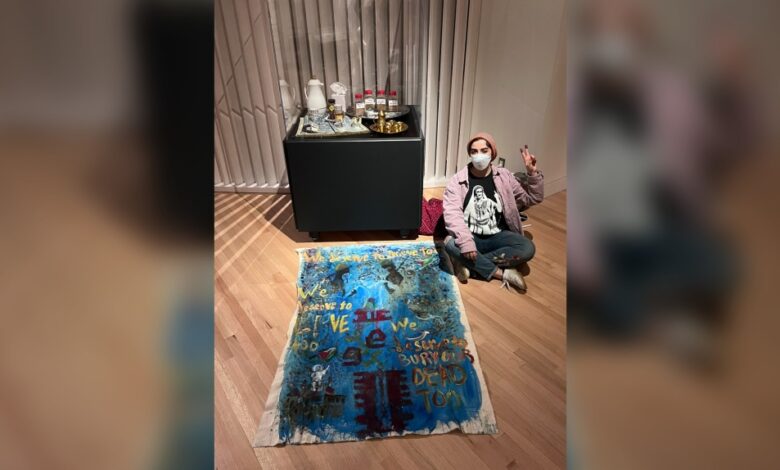Artist speaks out after ROM removed portion of exhibition

The Royal Ontario Museum (ROM) has re-instated an exhibition after the artists behind it staged an 18-hour sit-in to protest what they said amounted to censorship.
“Death: Life’s Greatest Mystery” opened at the ROM on Oct. 28. The exhibition claims to explore “how life and death are part of a universal, continuous and cyclical process.”
But in an Instagram post over the weekend, the artists behind the exhibition claimed the ROM had removed a panel depicting the word “Palestine” from the work without their permission, as well as “other texts and images relating to Palestine,” a move they collectively called “censorship.”
The artists staged a sit-in protest at the ROM that began late Saturday afternoon and continued into Sunday.
In their post, they said the ROM was “complicit in dehumanization of Palestinians in both life and death” by removing the hand-embroidered image of a poppy, which represents the Palestinian flag and the lives of those lost at the hands of occupation.
But in a statement to media on Sunday, representatives for the ROM said the museum had merely “proposed modifications to some content in an effort to keep the focus of the exhibition on the cultural practices, rituals, and science surrounding life and death, rather than current events.
“Making adjustments to touring exhibitions and adapting content for the local audience is standard museum practice, and is done in consultation with the originating institution,” the statement noted.
The ROM has said that the exhibition will be temporarily closed while they reinstate the materials related to Palestinian Muslim burial practices and Jewish cultural content, as originally displayed at the Field Museum in Chicago.
“The proposed changes to materials related to Palestinian cultural traditions were brought to the Field Museum’s community advisory members, starting a dialogue which has now come to a resolution. As a result of these conversations, ROM will present the panels and labels related to Palestinian Muslim burial practices and Jewish cultural content as originally displayed,” the statement notes.
But the artists say they are still upset with their treatment.
In an interview with CP24 on Wednesday Jenin Yaseen, one of the affected artists, said the ROM has proposed adding a disclaimer on the exhibit saying that the views expressed in the artwork do not reflect those of the museum.
She said that doing so “invalidates” her experience and voice.
“I feel like the museum…is completely dehumanizing me, invalidating my experiences and realities. A disclaimer isn’t necessary. I don’t see any other art pieces that have that,” she said.
Yaseen says she hopes ROM visitors who see the artwork are able to take away that the Palestinians depicted in the canvas are “not just numbers.”
“They’re human beings with dreams and hopes, and they’re being completely eradicated,” she said.
“We are all grieving.”




